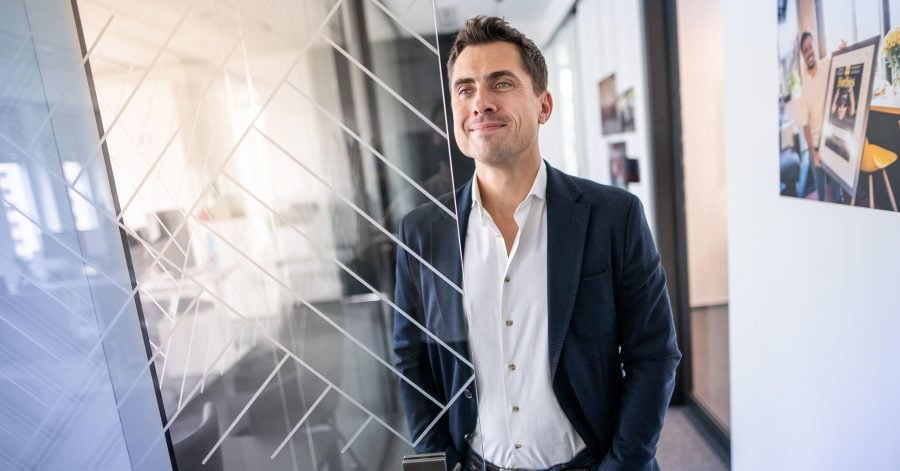Central and Eastern Europe (CEE) is rich in talent. The region produces world-class engineers and researchers in AI, cybersecurity, and deep tech. Bold ideas with strong IPO potential are in no short supply, either. What’s missing is much better access to both capital and expertise; without it, many startups in the region hit a wall long before they reach their potential.
Productboard, UiPath, and Grammarly all started in CEE, but only reached their full potential after expanding to the U.S. Founders in the region often know how to build, but struggle to scale. Europe’s fragmented markets, orthodox capital, and limited pool of experienced go-to-market leaders create invisible ceilings that even the best teams can’t break through.
This is the gap we need to bridge: We need to build the capability to provide capital and expertise for U.S.-style expansion in Europe. Otherwise, we will increasingly rely on the U.S., and this brain drain, where the best founders and companies flee CEE, will continue, with troublesome results for the region.
Why CEE Startups Struggle to Scale: Access to Capital
Imagine two startups, both with equally strong products. One is founded in Warsaw, the other one in Silicon Valley. Despite having similar potential, the U.S.-based startup gains investor attention faster, scales without serious friction, and accesses a deep pool of experienced talent and growth capital.
The Polish startup, meanwhile, must navigate linguistic, regulatory, and cultural differences with every new market entry. Germany requires one go-to-market strategy, France another.
This contrast stems from fundamental structural differences. The U.S. offers a unified market: one language, one legal system, one currency, and nearly 350 million consumers. This cohesion allows startups to scale quickly and efficiently. In Europe, by contrast, fragmentation is the norm. Regulation varies widely, localization is a constant challenge, and early-stage expansion across borders often requires significant adjustment.
All of this means that a successful U.S. startup has a much greater chance of reaching a high valuation, leading to significantly higher returns for investors. In turn, these investors are able to take on more risk, write larger checks to early-stage startups in turn, and move faster in their decision-making. This dynamic is reinforced by the U.S. having been a hub for venture capital for decades.
This difference can be expressed in numbers: In 2023, startups in the U.S. raised around $170.6 billion in VC funding, while those in Europe attracted just $45 billion, even though the EU has a larger GDP and population.
On a per capita basis, and especially when measured as a percentage of GDP, the disparity is even more striking. U.S. VC investment is estimated at around 0.9% of GDP, while Europe stands at 0.3%. In Central and Eastern Europe, the numbers are even lower: 0.007% in Czechia, 0.01% in Poland, and 0.014% in Hungary.
This matters. More capital flowing around the system means more startups get funded, more can survive the early stages, and more can grow into global players. The U.S. VC ecosystem benefits from a reinforcing cycle: Successful exits attract new capital, which fuels the next generation of founders.
Almost half of CEE scaleups relocate their HQ abroad
Europe, and especially CEE, is still working to build that kind of momentum. The impact of these limitations is already visible. Many of the most successful startups from Central and Eastern Europe expanded to the U.S. or even moved there entirely. It was the only way for them to reach their full potential.
UiPath moved its headquarters from Romania to New York. Grammarly, founded in Ukraine, now operates from San Francisco. Czech-born Productboard grew significantly after establishing a U.S. presence. Similar stories apply to Payhawk from Bulgaria, Infobip from Croatia, Blueground from Greece, and Booksy from Poland.
Almost half of CEE scaleups eventually relocate their headquarters abroad. According to estimates, the value of companies that have left the region exceeds $50 billion. While a few founders, such as Mews CEO Richard Valtr or Productboard’s Hubert Palan, do reinvest back into the region, this alone is not enough to build a strong startup environment.
Without a stronger ecosystem at home, CEE risks becoming a launchpad that others benefit from, rather than a region where innovation grows and stays.
The missing layer: capital alone is not enough
In much of Europe, and especially in Central and Eastern Europe, the ecosystem lacks a dense layer of experience that helps startups grow beyond their local markets. There are fewer serial founders, fewer go-to-market experts, fewer sector-focused angels, and fewer global-tier VCs who can guide companies through international expansion. While Europe boasts abundant technical talent, finding senior engineers with experience leading teams at the frontier of cutting edge technologies, especially in AI, still often requires looking across the Atlantic.
This knowledge gap becomes critical in growth stages, where most venture funding globally is concentrated. The region needs a long-term, trusted trans-Atlantic platform. One where capital, knowledge, and people move freely in both directions between Europe and North America. A network where success circulates back into the ecosystem instead of disappearing abroad. Without that, CEE will keep exporting its best potential instead of building on it.
How to deepen the interconnection
Across the U.S., particularly in the Bay Area, there is a growing community of European founders, operators, and investors who are eager to reconnect with their roots and support innovation in the region they came from. Many of them see the shifting political and economic climate in the U.S. as a sign that Europe must build stronger foundations of its own. Yet despite this, these connections remain informal and underused.
What is missing is a permanent structure — a platform that brings these two worlds into sync. A shared hub where U.S. investors can discover and support talent from Europe and CEE through a single, visible gateway.
Such a platform would help solve a deeper coordination problem, namely that the European diaspora in the U.S. is still siloed by country. As a result, U.S. investors and advisors often lack a clear view of who to engage with, which connections matter, and where to find the people who can truly move the needle.
Some efforts are already underway. A few startups and funds with CEE origin are exploring how to establish a presence in the Bay Area. But these initiatives are still early and often of an improvised nature.
The motivation to strengthen these connections is already there. Across the European diaspora in Silicon Valley, including experienced founders and technical talent from across Romania, Poland, Ukraine, Sweden, the Netherlands, to name but a few, there is a growing recognition that Europe needs to build its own strategic foundation. Many want to give back out of a sense of loyalty, or because they see the opportunity to shape the next chapter of European tech. The intent is strong. What is missing is the structure to channel it.
CEE already has the core ingredients
Imagine a version of Central and Eastern Europe where the most promising startups still expand globally and build a presence in places like the U.S., but without needing to permanently relocate all of their teams and operations. Where engineering talent working on breakthrough AI solutions can raise international capital while remaining rooted in the region. A future where moving abroad is a strategic choice, not a forced necessity. Where a growing number of startups have the chance to engage globally while building lasting impact at home. This vision is within reach, if we put the right foundations in place.
CEE already has the core ingredients: deep technical expertise, a generation of globally minded founders, and proven strength in areas like B2B SaaS, cybersecurity, and industrial innovation. They are the roots of what could become Europe’s next wave of global leadership in deep tech, agentic AI, defense technology, and climate solutions. By 2030, countries like Poland, Czechia, Estonia, Romania, and Ukraine could anchor a new center of gravity for European innovation.
To make this vision a reality, we need to stop seeing our ecosystem as an afterthought. We must design it to take the lead.








